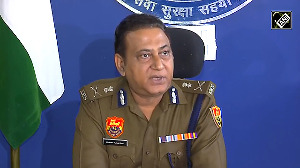There may be those who could want to go slow, citing the large pendency of follow-up action and court cases that they would have to process and/or proceed with, before raiding more politicians, observes N Sathiya Moorthy.

At the moment it may sound far-fetched, speculative or even mischievous.
But what if the non-BJP Opposition, especially the Congress rival at the national-level, wins many if not all five assembly polls currently underway?
Ahead of the Lok Sabha polls, can such a construct be construed as a popular mandate against what the on-again-off-again Opposition INDIA alliance calls the 'raid raj'?
If so, what are the politico-electoral consequences for the polity, society and nation as a whole?
The results of the five-state polls on December 3 will unravel the answer to this question.
If the Opposition were to win them, then definitely they will celebrate that the people's court has ruled in their favour and in a democracy, the people's verdict is the true and final verdict.
Such a course, in turn, could create a piquant situation. Nowhere do the law and even more the Constitution say that electoral verdicts can upset their role or upturn decisions in matters legal.
In turn, it flows that investigating agencies empowered under the law too have no political masters other than for administrative reasons, and they supposedly act independent of fear or favour, one way or the other.
It applies to income tax, Enforcement Directorate and Central Bureau of Investigation sleuths tasked with the continual raids on individual politicians and individuals and entities identified with them one way or the other.
In the normal course, however, electoral verdicts should affect their morale, and in turn that of their professional leadership.
There may be those who could want to go slow, citing the large pendency of follow-up action and court cases that they would have to process and/or proceed with, before raiding more politicians.
There may be others, more so those in the top rungs, who would want more raids, claiming that the processes could be taken up even under a new dispensation, even if politically not favourable to the present one at the Centre.
They may conclude that a post-poll dispensation, even if not involving the present BJP-NDA rulers, could at best delay the investigators' work and court processes, not stall them without consequences.
Those consequences could be in the form of courts, from bottom up, not allowing the agencies to withdraw pending cases or close ongoing investigations without legal justification.
In context, you now have Chief Justice Dhananjay Yeshwant Chandrachud, praising a judge of the Madras high court, sky high, for reopening criminal proceedings against some incumbent and former state ministers after the trial courts, in their time, had allowed them to be withdrawn by the state police, especially with a change of government.
In some cases, the lower courts have also acquitted the accused, based on 'facts and law', as they found fit.
Justice Anand Venkatesh at the Madras high court has taken it upon himself to reopen some of these cases under powers conferred by Article 192 of the Constitution.

Political influence and interference is one thing, but popular mandate is entirely another thing.
There is at least one solid case, where the Supreme Court of India declared that popular mandate sort of entailed and empowered an elected government at the Centre to undo at least some of the wrongs of the previous one.
In this particular case, the post-Emergency Janata Party administration of then prime minister Morarji Desai sacked nine Congress-ruled state governments, citing the popular mandate as the only justification, which was not constitutional but entirely political, rather electoral.
Later, the Congress returned the compliment when Indira Gandhi came back to power in the 1980 election.
Ahead of the 1977 dissolution, members of the Janata Party, led by then minister for posts and telegraphs -- he was later made the industries minister -- protested outside the residence of then acting President B D Jatti, shouting slogans like 'Sign or resign', urging that he sign the dissolution resolution passed by the Union Cabinet.
Having made a song and dance of the same, they could not oppose it politically or contest it legally, when the Indira Gandhi government dissolved the assembly in 10 Opposition-ruled states.
The new one belonged to Tamil Nadu, where then AIADMK chief minister M G Ramachandran was opposed to the Congress-DMK alliance, bagging his lowest-ever tally of two out of 39 Lok Sabha seats.
Of course, it was in an era before the Supreme Court verdict in the S R Bommai case (1994), only when the judiciary set out Constitutional safeguards against mindless and politically-motivated dismissal of state governments and dissolution of state assemblies. The Supreme Court-set scheme has worked, thankfully.

On specifics, there is the other case, involving then Tamil Nadu chief minister Jayalalithaa.
After the Madras high court had stayed the sentence against her in what is popularly known as the 'TANSI land deal case' pertaining to her first term as chief minister (1991 to 1996), Jaya contested the 2001 assembly polls, yes, from four separate constituencies, spread across the state.
As governor, Justice Fathima Beevi, the first woman to adorn the Supreme Court, hurriedly swore in Jaya as chief minister, going purely by the poll results, where the AIADMK had won a majority in the 234-seat state assembly.
The Supreme Court, when moved, ruled that the high court stay applied only to her sentence, and not the conviction, which stood.
Hence, under the law, Jaya could not continue as CM, pending the final disposal of the case.
On the appellate side, when moved, a division bench of the Supreme Court acquitted Jaya close to a year after the completion of the hearing in the case.
Jaya returned as CM, triumphantly, but only after winning an assembly seat from southern Andipatti, a favourite of her late political mentor and party founder, M G Ramachandran.
But the intervening message was clear. Pending a court conviction, as different from a suspended sentence, the Election Commission should not have accepted Jaya's nominations in four assembly constituencies, leading to her victory, and citing 'popular mandate' for self and the party to claim chief minitership.
It is another matter that if the governor, particularly a former Supreme Court justice, did not do due diligence before swearing Jayalalithaa as chief minister in the first place.
N Sathiya Moorthy, veteran journalist and author, is a Chennai-based policy analyst & political commentator.
Feature Presentation: Aslam Hunani/Rediff.com











 © 2025
© 2025